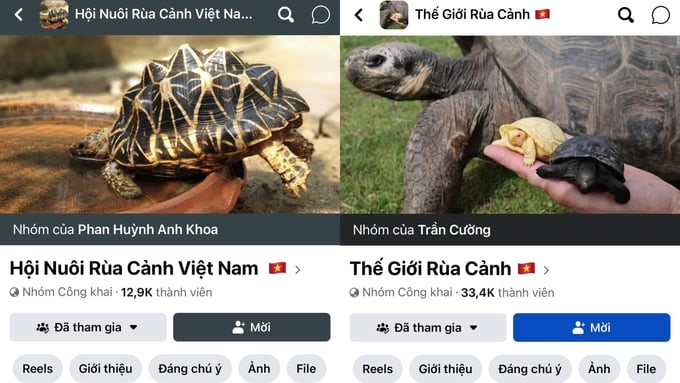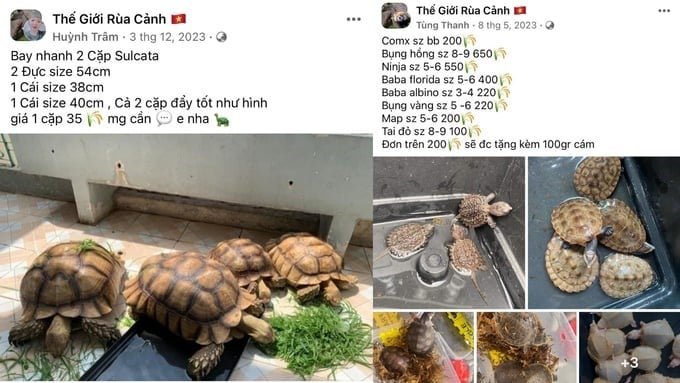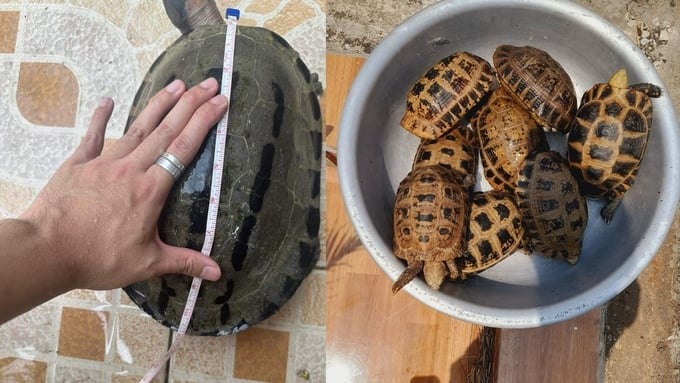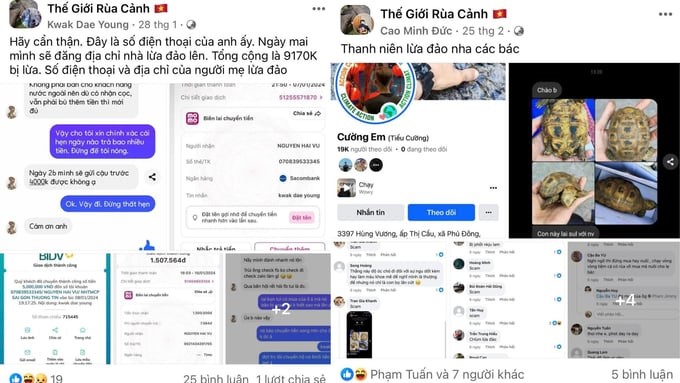June 18, 2025 | 16:30 GMT +7
June 18, 2025 | 16:30 GMT +7
Hotline: 0913.378.918
June 18, 2025 | 16:30 GMT +7
Hotline: 0913.378.918
Although the situation of selling rare and precious turtles is not new, it has never stopped being 'hot', and is even becoming more and more persistent when illegal acts show signs of increasing again on social networking platforms. Because subjects can earn "huge" profits from this job.
According to Ms. Bui Thi Ha, Deputy Director of the Education for Nature Vietnam (ENV) Center, in the past two years, violations of buying and selling turtles on social networks have increased alarmingly. Taking advantage of the ability to easily access buyers and hide their identities, many subjects often sell rare and precious turtles in the internet space.
As a person who wants to buy rare and precious turtle species, reporters just need to search for the phrase "finding pet turtles" on the Facebook social network, and dozens of closed groups will appear with names like "World of Ornamental Turtles," "Raising Vietnamese Ornamental Tortoises," "Vietnamese Turtle Community," etc. All of them have from a few dozen to a few hundred thousand members and operate actively every day.

Closed groups buy and sell turtles in the internet space. Photo: Hung Khang.
Here, from popular turtle species such as red-eared slider turtle and alligator snapping turtle to some endangered, rare, and precious turtle species such as elongated tortoise, Vietnamese three-striped box turtle, Cuora galbinifrons, Heosemys annandalii, yellow-headed temple turtle, giant Asian pond turtle, and pig-nosed turtle are for sale every day.
After many days of getting acquainted and interacting with account owners who posted on the closed group, the reporter contacted a Facebook account owner named Tr.C.A. living in Con Cuong, Nghe An, to pretend to order elongated tortoises with a price of VND 1–1.2 million/head from this subject.
This account owner sells turtles with familiar offers, such as: This turtle is the owner's turtle; Buyers do not have to think about documents; This species is the easiest to raise among the tortoise species; No matter how many the buyer orders, the owner
In fact, it is almost impossible to verify the origin of a turtle before ordering online. Because when there is a need to buy, the seller does not provide legal documents for the buyer to see. In many cases, the seller even has to disguise turtles as jewelry or cosmetics when transporting them to avoid the eyes and ears of the functional agency.

Subjects are very careful when using sensitive words to easily bypass the functional agency. Photo: Hung Khang.
It is special that in these closed groups, there are always hidden rules. For example, when posting, absolutely do not use words like buy and sell, price, or turtle species names. Instead of this, members will have to change to other conventional terms. Specifically, the image of a rice ear replaces the price, and the word "fly" replaces the word "sold."
If anyone violates, their post will immediately be deleted by the admin, or worse, they will be removed from the group. The fact that turtle trading groups must use hidden rules is to avoid violating Facebook's policies and limit the risk of the group being deleted. Because this social network's commercial policy currently does not allow the trading of wild animals, even in buying and selling groups. Thanks to Admin's sophistication and ingenuity in operating the group, the virtual turtle trading market is maintained with a large number of participants.
This virtual market not only exists for the purpose of sharing knowledge and experience in raising turtles but also becomes a place to trade turtles among members in order to bypass the functional agency. Although they only exist in the internet space, these closed groups have dozens of successfully closed transactions every day. By spending only a few hundred to a few million dong, buyers can immediately own a favorite turtle, including those on the rare and endangered list.
More articles about turtles are posted for sale because they are cheap, easy to raise, and sought after by many people. Yellow-shelled turtles are priced at about VND 400,000–600,000 per head, with a size of 7–8cm. Some types of small turtles are also sold at prices of 2–2.5 million VND/head, depending on size, such as alligator snapping turtles.

These turtle species are posted by account owners to trade in the group. Photo: Hung Khang.
Some rare and precious turtle species often have high prices, such as elongated tortoises, priced at VND 600,000–900,000/head. Giant Asian pond turtles cost VND 400,000/small-sized head. As for large and rare turtle species, their prices can be up to several tens of millions of dong per head. Although their prices are expensive, these turtle species are always sought after by buyers in the hope that they can breed, raise, and then resell for profit.
After many days of monitoring turtle trading activities in closed groups, there were many bad and funny stories in these groups because not everyone is lucky enough to successfully buy real turtles. Many subjects force buyers to transfer a certain amount of money in advance before submitting an order to ship. After many days of waiting without seeing the turtle, many people wrote posts to warn group members.

Many people transferred a deposit to buy a turtle and still did not receive the turtle after a month. Photo: Hung Khang.
Never before have so many rare and precious turtle species been traded openly like now. While wishing to raise rare and precious turtles for commercial purposes, the farm itself, as well as the turtle supplier and seller, must be licensed and have a registration code for the facility raising endangered wild animals issued by the CITES management agency for each turtle individual.
Turtle trading subjects have exploited the advantages of social networks for exchange and trade, threatening the biodiversity of this animal species. The Facebook social network has advantages such as non-direct transactions, remote connection capabilities, and anonymity, and has become a 4.0 market for exchanging and trading rare and precious turtle species. And this virtual market has become a real turtle trading market.
Every day that passes, it is impossible to count how many rare and precious turtles are advertised for sale on social networks and delivered to consumers. It is time for the functional agency to be more forceful and apply legal regulations to effectively handle the act of buying and selling turtles.
Translated by Huyen Vu Thu

(VAN) According to the Binh Thuan Department of Industry and Trade, in the first five months of 2025, Binh Thuan's dragon fruit export turnover increased by 20.65% compared to the same period last year.

(VAN) EU countries on Thursday gave final approval to new tariffs on fertilizer imports from Russia, a move aimed at cutting off revenue that could support Moscow’s war in Ukraine, despite concerns from European farmers.

(VAN) The working delegation from the Ministry of Agriculture and Environment conducted an important trip to the Netherlands to strengthen strategic partnerships and sustainable development in the agricultural sector.

(VAN) The letter ‘A Plea from the Ocean’ not only evokes emotion but also awakens the human conscience to the responsibility of protecting life on Earth.

(VAN) The Department of Agriculture in South Africa has announced the country’s first mass vaccination of poultry to prevent local birds from contracting avian influenza.

(VAN) Establishment of the Mekong Delta Regional Agricultural Linkage Center, aiming for a closed value chain, deep processing, trading platforms, and international market connectivity.

(VAN) Gia Lai province has recently recorded 460 rare species of animals and plants, contributing to forest conservation and biodiversity planning in the region.